Free Online Productivity Tools
i2Speak
i2Symbol
i2OCR
iTex2Img
iWeb2Print
iWeb2Shot
i2Type
iPdf2Split
iPdf2Merge
i2Bopomofo
i2Arabic
i2Style
i2Image
i2PDF
iLatex2Rtf
Sci2ools
130
click to vote
QUESTA
2007
2007
Priority queueing systems: from probability generating functions to tail probabilities
Obtaining (tail) probabilities from a transform function is an important topic in queueing theory. To obtain these probabilities in discrete-time queueing systems, we have to invert probability generating functions, since most important distributions in discrete-time queueing systems can be determined in the form of probability generating functions. In this paper, we calculate the tail probabilities of two particular random variables in discrete-time priority queueing systems, by means of the dominant singularity approximation. We show that obtaining these tail probabilities can be a complex task, and that the obtained tail probabilities are not necessarily exponential (as in most ’traditional’ queueing systems). Further, we show the impact and significance of the various system parameters on the type of tail behavior. Finally, we compare our approximation results with simulations. keywords priority queueing systems, tail probabilities, dominant pole, non-exponential behavior
Related Content
| Added | 27 Dec 2010 |
| Updated | 27 Dec 2010 |
| Type | Journal |
| Year | 2007 |
| Where | QUESTA |
| Authors | Tom Maertens, Joris Walraevens, Herwig Bruneel |
Comments (0)

